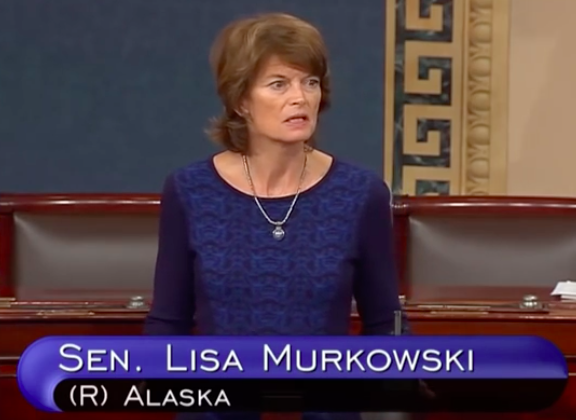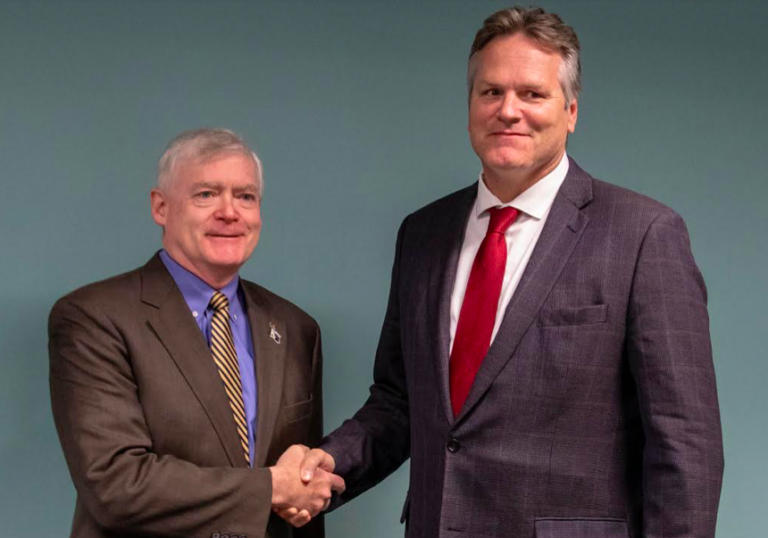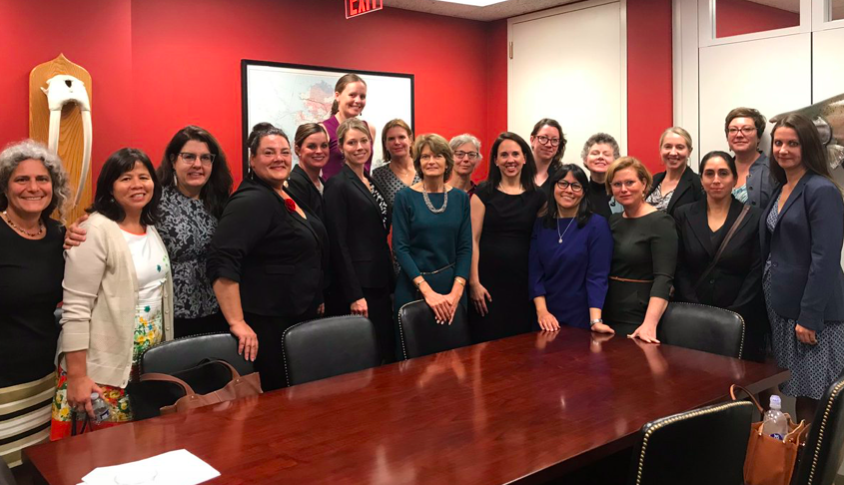WHAT SENATOR MURKOWSKI TOLD COLLEAGUES
Buried in her remarks on the Senate floor on Friday, Sen. Lisa Murkowski indicated she will be marked present, but she will not vote at all on Saturday.
In that way, her “non-vote” will neutralize the also “non-vote” of Sen. David Daines of Montana, who will be walking his daughter down he aisle for her wedding during the confirmation vote of Brett Kavanaugh to the Supreme Court.
The transcript of her remarks provided by her office show that she now is against Kavanaugh because of his temperament:
“I’ve come to the floor this evening to share my thoughts on what has been an extraordinarily long, difficult, and truly painful process. As we took up the cloture motion on the nomination of Brett Kavanaugh to the United States Supreme Court, the process that led us to this vote today has been, in my view, a horrible process. A gut-wrenching process, where good people have been needlessly hurt. Where a woman who never sought the public spotlight, was, I think, cruelly thrust into the brightest of spotlights. A good man, a good man, with sterling academic credentials and unblemished professional record, both as the lawyer, the professional lawyer he was, and judge, and also as a husband and father of two young girls, has been damaged terribly. And as both of these individuals, Dr. Ford and Judge Kavanaugh, have been harmed—their families have too. We need to, we must do better by them. We must do better as a Legislative Branch. We have a moral obligation to do better than this.
“I spent more time evaluating and considering the nomination of Judge Kavanaugh than I have with any of the previous nominations to the United States Supreme Court that I’ve been privileged to review. I’ve had the opportunity to vote on five Justices prior to this. And I took my time. I was deliberate, thoughtful. Some accused me of being too deliberate, too thoughtful, taking too much time. But this is important to me. It should be important to all of us. And I know that it is important to all of us. And so I studied the record. I sat with Judge Kavanaugh for a lengthy period of time, about an hour and a half, and asked the questions that I had and then did more due diligence. I reviewed the cases and I did my homework. I listened to the concerns that were raised by many in my state on issues that were all over the board. Whether it was a woman’s right to choose, the Affordable Care Act, Executive Authority, deference to the agencies, Native issues—I took considerable time. And when the hearings came, not being on the Judiciary Committee, I paid attention. I followed the testimony of the judge, the very critical questioning from many of my colleagues on the other side of the aisle. And then when, at the end of the process, or so seemingly what we believed to be the end of the process, there were more questions, I went back to Judge Kavanaugh and had a good conversation with him. And then the allegations that we have been discussing and trying to understand more about came forward and we all moved from focusing on the issues to truly a discussion that none of us ever thought that we would be having when it came to the confirmation process for the highest court in the land.
“And so there was more work to be done. I was one who wanted to make sure that there was a process going forward. And when there were more questions that were raised after the initial process, I was one who joined in asking that the FBI step in and do further review. And so I have been engaged in this lengthy and deliberative process for months now. And I was truly leaning towards supporting Judge Kavanaugh in his nomination as I looked to that record. But we know that in our role of advice and consent, it is not just the record itself. There is more that is attached to it. It is why, when in the state of Alaska, a nomination for a judge goes forward, you rate them not only on their professional competence, what they have demonstrated through their record, but also matters of temperament and demeanor—which are very, very important.
“So, we moved, we shifted that conversation, from so many of the issues I had been focused on to other areas that are also important in evaluating a nominee for the courts. But I listened very carefully to the remarks—the strong, well-articulated remarks—of my colleague and my friend who sits next to me here, Senator Collins. And I found that I agreed with many of the points that she raised on the floor earlier. I do not think that Judge Kavanaugh will be a vote to overturn Roe V. Wade. And I also join with her in saying that I do not think that protections for those with pre-existing conditions will be at risk. And I also do not think that he will be a threat to Alaska Natives. This is an issue that had certainly been raised. But I had extended conversations with the judge on just these issues. And I believe that he recognizes, as he told me, that Alaska Natives are not in that identical place as Native Hawaiians. Alaskan tribes are included on the list of federally recognized tribes and the fact remains that Native Hawaiians are not. This is a distinction. This is a difference. I am one who, in this body, has said I would like to see Native Hawaiians there. And I worked with my friend Senator Akaka when he was in this body to help advance that. I have supported those, but the fact remains that that constitutional status of Alaska Natives in the Indian Commerce Clause are simply not at play with this nomination. I don’t believe that.
“So, the question fairly asked, ‘You say that you think he’s going to be there on issues that matter to Alaskans that you have taken strong positions on.’ The reason I could not support Judge Kavanaugh in the cloture motion the afternoon, is that in my role and my responsibility as one Senator on this floor, I take this obligation that we have in the role of advice and consent as seriously as anything that I am obligated or privileged to be able to vote on. And so I have a very high standard. I have a very high bar for any nominee to the Supreme Court of the United States.
“The Code of Judicial Conduct Rule 1.2 requires that a judge ‘act at all times in a manner that promotes public confidence in the independence, integrity, and impartiality of the judiciary, and shall avoid impropriety and the appearance of impropriety.’ And I go back and I look to that. It is pretty high, it is really high, that a judge shall act at all times—not just sometimes when you’re wearing your robe—in a manner that promotes public confidence. Public confidence. Where’s the public confidence?
“So it is high. And even in the face of the worst thing that could happen, a sexual assault allegation; even in the face of an overly and overtly political process, a politicized process; even when one side of this chamber is absolutely dead set on defeating his nomination, from the very get-go, before he was even named; even in these situations, the standard is that a judge must ‘act at all times in a manner that promotes public confidence in the independence, integrity, and impartiality of the judiciary, and shall avoid impropriety and the appearance of impropriety.’
“After the hearing that we all watched last week, last Thursday, it became clear to me, or it was becoming clearer that that appearance of impropriety has become unavoidable. And I’ve been deliberating, agonizing about what is fair. Is this too unfair a burden to place on somebody that is dealing with the worst, the most horrific allegations that go to your integrity, that go to everything that you are. And I think we all struggle with how we would respond. But I am reminded there are only nine seats on the bench of the highest court in the land and these seats are occupied by these men and women for their lifetime and so those who seek one of these seats must meet the highest standard in all respects at all times and that is hard.
“Mr. President, we are at a time when many in this country have lost faith in the Executive Branch, and it’s not just with this administration. We saw much of that in the last as well. And here in Congress, many around the country have just given up on us, they’ve just completely said, ‘we’ve had enough.’ But I maintain that the public still views, I still view, that there is some small shred of hope that remains with our judiciary. This judiciary that must be perceived as independent, as nonpartisan, as fair and balanced, in order for our form of government to function. And it’s that hope, it’s that hope that I seek to maintain. And I think that’s why I have demanded such a high standard to maintain or regain that public confidence, because it is so critical that we have that public confidence in at least one of our three branches of government.
“Mr. President, I think we saw from the vote earlier today, we’ve seen from statements from several of our colleagues that it does appear that Judge Kavanaugh will be seated on the Supreme Court, without my vote. It is my hope, it is truly my hope that Judge Kavanaugh will share that same hope in rebuilding, maintaining a level of public confidence, that he will strive for that ideal every day. It’s my hope that he will be that neutral arbiter, the umpire who only calls the balls and the strikes, that he will be that force for stability. I believe that Judge Kavanaugh is a good man. He’s a good man. He’s clearly a learned judge, but in my conscience, because that’s how I have to vote at the end of the day, with my conscience, I could not conclude that he is the right person for the court at this time. And this has been agonizing for me with this decision. It is as hard a choice, probably as close a call as any that I can ever remember. And I hope, I hope and I pray that we don’t find ourselves in this situation again. But I’m worried. I am really worried that this becomes the new normal, where we find new and even more creative ways to tear one another down. That good people are just going to say, ‘Forget it. It’s not worth it.’ I’m looking at some of the comments that are being made, the statements that are being made against me, against my good friend, my dear friend from Maine. The hateful, the aggressive, the truly, truly awful manner which with so many are acting now is got to end. This is not who we are. This is not who we should be. This is not who we raise our children to be.
“So, as we move forward in this very difficult time I think for this body and for this country I want to urge us to a place where we are able to engage in that civil discourse which is what the Senate is supposed to be all about, that we are able to show respect for one another’s views and differences, and that when a hard vote is taken, that there is a level of respect for the decision that each of us makes. And there’s another thing that I do hope, and again, I’ll refer to my friend from Maine, and I will note, if there has been a silver lining in these bitter, bitter weeks, which quite honestly remains to be seen, I do think what we have seen is a recognition by both sides, a recognition by both sides that we must do more to protect and prevent sexual assault and to help the victims of these assaults. There has been a national discussion. There has been an outpouring of discussion, conversation, fears, tears, frustration, and rage. There’s an emotion that really has been unleashed in these recent weeks, and these are discussions that we need to have as a country. We need to have these as a country. We need to bring these survivors to a place where they feel that they can heal. But until you come out of the shadow and do so without shame, it’s pretty hard to heal.
“I have met with so many survivors and I know that every single one of us has. And I’ve heard from colleagues as they have shared with me that they have been truly surprised, many stunned by what they are learning as the prevalence of this unfortunately in our society today. In Alaska, and the presiding officer knows in your state, the levels of sexual assault that we see within our Native American and our Alaska Native communities, the rates are incredibly devastating. It is not something that we say we’ll get to tomorrow. We’ve heard those voices. We’ve heard those voices, and I hope that we have all learned something, that we owe it to the victims of sexual assault to do more and to do better and to do it now with them.
“Mr. President I’m going to close and thank you, but I truly hope that we can be at that place where we can move forward in a manner that shows greater respect, greater comity.
“We owe it to the people of America to return to a less rancorous process. In the spirit of that comity, and again while I voted no on cloture today, and I will be a no tomorrow. I will, in the final tally, be asked to be recorded as present, and I do this because a friend, a colleague of ours is in Montana this evening and tomorrow at just about the same hour that we’re going to be voting, he’s going to be walking his daughter down the aisle and he won’t be present to vote, and so I have extended this as a courtesy to my friend. It will not change the outcome of the vote, but I do hope that it reminds us that we can take very small, very small steps to be gracious with one another and maybe those small, gracious steps can lead to more.
“But, I know that is hard as these matters are that we deal with. We’re humans, we have family that we love. We don’t spend near enough time with them and making sure that we can do one small thing to make that family a little bit better is a better way for tomorrow.
“With that Mr. President, I yield the floor, and thank you.”












